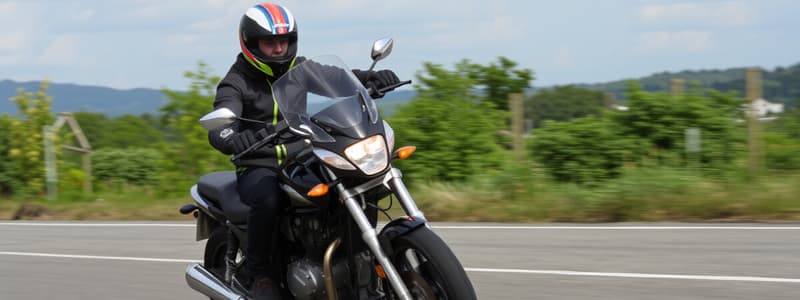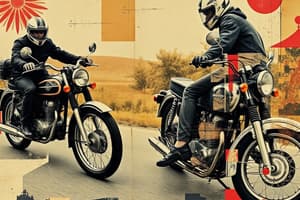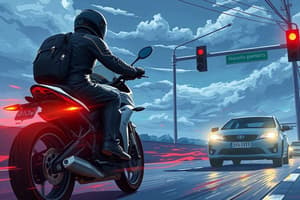Podcast
Questions and Answers
What does SAM stand for in the context of the BRC?
What does SAM stand for in the context of the BRC?
Safety and risk management, adult and accelerated learning, and motor skills development.
What are the components of Specialized Skills and Behaviors for safe motorcycle operation?
What are the components of Specialized Skills and Behaviors for safe motorcycle operation?
- Physical skills (correct)
- Emotional skills (correct)
- Social skills (correct)
- Mental skills (correct)
What are mental skills in motorcycle riding?
What are mental skills in motorcycle riding?
How a person processes information and makes decisions.
How are physical skills defined in terms of motorcycle operation?
How are physical skills defined in terms of motorcycle operation?
What encompasses social skills in motorcycle riding?
What encompasses social skills in motorcycle riding?
Define emotional skills in the context of riding.
Define emotional skills in the context of riding.
What does 'skills of the eyes and mind' refer to in safe riding?
What does 'skills of the eyes and mind' refer to in safe riding?
Which of the following are strategies to minimize risk? (Select all that apply)
Which of the following are strategies to minimize risk? (Select all that apply)
What kind of environment does a formal classroom provide?
What kind of environment does a formal classroom provide?
What concepts and principles should classroom activities follow?
What concepts and principles should classroom activities follow?
What does 'facilitation' mean?
What does 'facilitation' mean?
What is the focus of a learning environment?
What is the focus of a learning environment?
Match the stages of motor skill development:
Match the stages of motor skill development:
What is the best way to learn motor skills?
What is the best way to learn motor skills?
What are gross motor skills?
What are gross motor skills?
What are fine motor skills?
What are fine motor skills?
What is overcoaching?
What is overcoaching?
What is undercoaching?
What is undercoaching?
What does a gross motor skill outline involve?
What does a gross motor skill outline involve?
What is the MSF RETS Safety Pyramid?
What is the MSF RETS Safety Pyramid?
What are the five major skills of learning to ride?
What are the five major skills of learning to ride?
Define executive functions in relation to riding.
Define executive functions in relation to riding.
What is perception in accident causation?
What is perception in accident causation?
How can a rider reduce contributing factors to crashes?
How can a rider reduce contributing factors to crashes?
How long does it take to reduce risk in riding?
How long does it take to reduce risk in riding?
What is the primary challenge for a rider to be safe?
What is the primary challenge for a rider to be safe?
What is brain-based learning?
What is brain-based learning?
What are brain-based learning characteristics?
What are brain-based learning characteristics?
Define cognitive development in motorcycle riding.
Define cognitive development in motorcycle riding.
What are the riding sub-tasks? (Select all that apply)
What are the riding sub-tasks? (Select all that apply)
What defines the mental/perceptual riding sub-task?
What defines the mental/perceptual riding sub-task?
What constitutes the physical riding sub-task?
What constitutes the physical riding sub-task?
What is the social riding sub-task?
What is the social riding sub-task?
Define the emotional riding sub-task.
Define the emotional riding sub-task.
What are the three areas of learning?
What are the three areas of learning?
What is learning defined as?
What is learning defined as?
What does FEEL stand for?
What does FEEL stand for?
Flashcards are hidden until you start studying
Study Notes
SAM
- Refers to core concepts within the Basic Rider Course (BRC): Safety and risk management, adult and accelerated learning, motor skills development.
Specialized Skills and Behaviors
- Includes mental (70-80%), physical, social, emotional skills, and the use of eyes and mind in riding.
Mental Skills
- Involves processing information and making decisions effectively.
Physical Skills
- Concerns manipulation of motorcycle controls for smooth, precise actions.
Social Skills
- Relates to courteous interactions and cooperation with others in traffic.
Emotional Skills
- Influences decision-making based on one’s attitude at any moment.
Skills of the Eyes and Mind
- Emphasizes that safe riding relies more on visual and cognitive skills than on physical control.
Strategies to Minimize Risk
- Wearing protective gear, using perception to identify traffic and road issues, maintaining a low-risk attitude, and keeping skills fresh.
Formal Classroom Environment
- Describes a dynamic, interactive, and learner-centered approach to teaching.
Classroom Concepts
- Incorporates adult learning, accelerated learning, and brain-based learning principles.
Facilitation
- Defined as making the learning process easier for participants.
Focus of a Learning Environment
- Centers around engagement and active participation by learners.
Stages of Motor Skill Development
- Early or cognitive, intermediate or associative, final or autonomous stages mark the progress in skill acquisition.
Best Motor Skills Learning Method
- Advocates teaching whole skills first, followed by finer skills through ongoing practice and coaching.
Gross Motor Skills
- Involve larger muscle groups; should be practiced before fine motor skills.
Fine Motor Skills
- Focus on smaller muscle control, learned after mastering gross motor skills.
Overcoaching
- Known as Type I error, refers to excessive instruction that can hinder learning.
Under Coaching
- Identified as Type II error, represents insufficient guidance, leading to skill deficits.
Gross Motor Skill Outline
- Refers to a demonstration that showcases the essential gross motor skills.
MSF RETS Safety Pyramid
- Comprises 23 cells that reinforce foundational skills necessary for learning to ride safely.
Five Major Skills of Riding
- Encompasses basic knowledge, skills, attitudes, habits, and values essential for safe riding.
Executive Functions
- Brain activities involved in regulating cognitive and behavioral processes relevant to decision-making.
Perception
- Understanding crash causes as an interaction of factors and recognizing how good riders minimize risks through thoughtful strategies.
Executive Functions Q&A
- Highlights the immediate nature of risk reduction decisions and emphasizes mindfulness in avoiding collision traps.
Brain-Based Learning
- Focuses on the brain's role in processing and retaining educational information.
Characteristics of Brain-Based Learning
- Active processing, relaxed alertness, and organized content enhance learning experiences.
Cognitive Development
- Involves basic knowledge synthesis and self-evaluation capabilities, supported by a positive attitude.
Riding Subtasks
- Divided into mental perceptual, physical, social, and emotional components essential for safe riding.
Mental/Perceptual Riding Subtask
- Refers to the ability to process information and make informed decisions while riding.
Physical Riding Subtask
- Pertains to the effective operation of motorcycle controls.
Social Riding Subtask
- Involves adherence to rules, regulations, and practicing courtesy on the road.
Emotional Riding Subtask
- Represents a commitment to safety through a mindful riding attitude.
Areas of Learning
- Addresses mental, motivational, and muscular aspects for a comprehensive riding education.
Definition of Learning
- Noted as a behavioral change demonstrating enhanced skill, attitude, values, and habits.
FEEL
- Represents a creative, engaging, and effective learning activity that is fun, efficient, and centered around the learner.
Studying That Suits You
Use AI to generate personalized quizzes and flashcards to suit your learning preferences.




